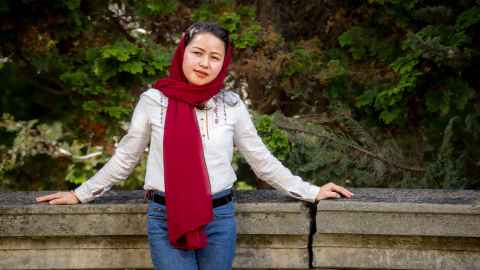Afghanistan to Auckland: judge's move for freedom
6 November 2023
When the Taliban took control of Afghanistan, women pursuing education or careers, like Judge Raihana Attaee, had no choice but to go into hiding.

A year ago, Ingenio carried the astounding story of how the International Association of Women Judges, led by New Zealand Justice Dame Susan Glazebrook, helped some 200 women judges to escape Afghanistan after the Taliban reached Kabul in August 2021.
Six judges resettled in Aotearoa New Zealand, including Raihana Attaee, who had been the only woman judge at the Nangarhar province Court of Elimination of Violence Against Women, despite being a member of the oppressed Hazara ethnicity. Now, having brushed up her school-learned English, the softly spoken 33-year-old is relieved to be retraining in New Zealand law at the University of Auckland, learning the differences between Afghanistan’s civil law system and our common law.
“When you come to a new country, it is like starting from zero, your mind is empty of any facts about your new home,” she explains.
“And when you start studying the facts about your new country, it gives you a sense of understanding and belonging. I am happy.”
In the harrowing months before she and her husband Maqsood Rezayee escaped from Afghanistan, they were in hiding with their toddler son, virtually imprisoned but always on the move. Raihana believed either the Taliban or any prisoner they released “would find me and kill me very soon,” she wrote for the 2022 NZ Women’s Law Journal. She received threatening phone calls from a dangerous criminal she had sentenced to 20 years in prison for killing his wife.
“I was regretting being a mother … my child was being punished because of his mother’s job.”
One night, Maqsood’s mother Adila saved the family hiding in her house by telling Taliban searchers they couldn’t come in as no man was present. The family had to flee at midnight, with no money. Raihana messaged Dame Susan’s group, who found them a restful safe house for 20 days, a charter flight to Greece, and ultimately visas to Auckland, including for Adila, and Maqsood’s sister.
I was regretting being a mother … my child was being punished because of his mother’s job.
Raihana says Dame Susan was “incredible” throughout – replying reassuringly to many judges’ desperate messages even though, Raihana now knows, their daytime messages must have reached the judge during the night.
Raihana knew very little about New Zealand but, serendipitously, just before the Taliban takeover, Maqsood had begun studying remotely towards a doctorate in urban planning at the University of Auckland after he received the Philip Deibert PhD Scholarship in Planning.
The family is now settling in well, pleased to find other Hazara people here. Raihana’s pre-schooler son likes kindy, and his grandmother looks after him when his parents are studying. Raihana’s interest in gender violence prevention continues, although she’s not yet sure what her law speciality here will be.
Sadly, Raihana’s inspirational, supportive father died in Afghanistan this year.
“Even when I moved to New Zealand, he always called me and said, ‘Continue! Go to university, you can build your life there,’” she says.
She remembers him as a remarkable and brave community leader, striving to protect their village from Taliban interference in the 1990s and, once the Taliban were deposed, travelling to Kabul to successfully lobby the new government for a village school, for both girls and boys.
Changes in Afghan politics and society can be traced in the lives of Raihana and her six siblings: one brother is a medical specialist still in Afghanistan; a dentist sister escaped to Pakistan, then Iran, and hopes to join her partner in Australia; and Raihana’s oldest sister is illiterate, like their mother. Raihana’s nieces in Afghanistan are educated – but their past opportunities have now disappeared.
As a small child, Raihana thought village life was her destiny. But her father had a different message.
“He said, ‘If you study, you will be different. Knowledge is power.’”
This story appears in the Spring 2023 edition of Ingenio.